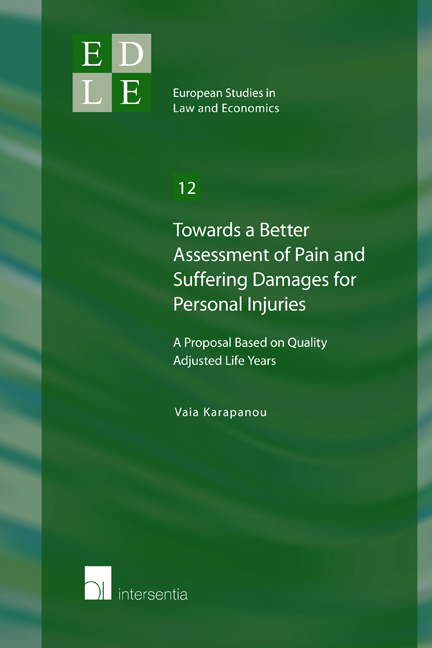 Towards a Better Assessment of Pain and Suffering Damages for Personal Injuries
Towards a Better Assessment of Pain and Suffering Damages for Personal Injuries Published online by Cambridge University Press: 22 November 2017
This book is concerned with personal physical injuries that occur in a tort law context. This implies that in case of an illicit act resulting in injury, the rules of tort law apply in affirming liability and awarding damages. Thus, a party may be liable for inflicting a personal physical injury if she has acted illegally intentionally or through negligence. In certain cases she may even be strictly liable irrespective of her culpability. To found liability, a causal link must exist between the unlawful behavior and the injury inflicted in all three cases and additionally, only in cases of negligence, a duty of care and a breach of this duty are required, the definition of which may differ per country. The tort law context further implies that the parties involved in the dispute arising due to the infliction of injury may be perfect strangers, such as the parties to automobile accidents, or may previously have had a consensual/contractual or market relationship such as the parties involved in medical malpractice cases (doctor– patient), cases of product liability (manufacturer/seller–consumer) and cases of work-related accidents (employee–employer). In the latter cases, if a contractual agreement already exists before the injury was inflicted, the injured party may be able to claim for damages both on the basis of a tort and on the basis of a breach of contract, provided of course that this is allowed by the legal system at hand.
Personal physical injuries may generate two types of losses: monetary losses and immaterial losses. Monetary losses, frequently also referred to as pecuniary, may for instance consist of the loss of future earnings, the costs of hospitalization or doctor visits at home, the costs of paying a maid to clean the house, the costs of taking a taxi instead of driving to work, as well as any other cost incurred after the injury in order to sustain the injured person. With the exception of loss of future income, which is more challenging to assess, these losses are relatively easy to ascertain and compensate as they are incurred as a result of spending money on goods and services exchanged in markets, refunding the price of which will mend the loss.
To save this book to your Kindle, first ensure [email protected] is added to your Approved Personal Document E-mail List under your Personal Document Settings on the Manage Your Content and Devices page of your Amazon account. Then enter the ‘name’ part of your Kindle email address below. Find out more about saving to your Kindle.
Note you can select to save to either the @free.kindle.com or @kindle.com variations. ‘@free.kindle.com’ emails are free but can only be saved to your device when it is connected to wi-fi. ‘@kindle.com’ emails can be delivered even when you are not connected to wi-fi, but note that service fees apply.
Find out more about the Kindle Personal Document Service.
To save content items to your account, please confirm that you agree to abide by our usage policies. If this is the first time you use this feature, you will be asked to authorise Cambridge Core to connect with your account. Find out more about saving content to Dropbox.
To save content items to your account, please confirm that you agree to abide by our usage policies. If this is the first time you use this feature, you will be asked to authorise Cambridge Core to connect with your account. Find out more about saving content to Google Drive.